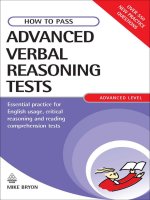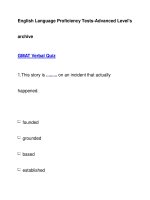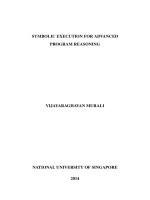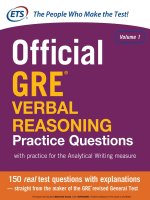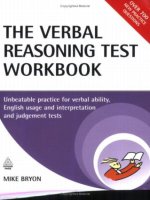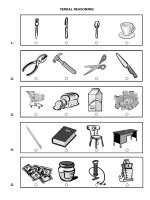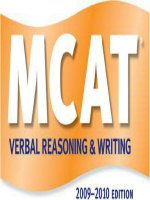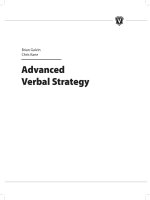Advanced verbal reasoning tests
Bạn đang xem bản rút gọn của tài liệu. Xem và tải ngay bản đầy đủ của tài liệu tại đây (1.52 MB, 242 trang )
HOW TO PASS
ADVANCED
VERBAL REASONING
TESTS
MIKE BRYON
London and Philadelphia
Publisher’s note
Every possible effort has been made to ensure that the information contained in this book is
accurate at the time of going to press, and the publishers and authors cannot accept responsibility for any errors or omissions, however caused. No responsibility for loss or damage
occasioned to any person acting, or refraining from action, as a result of the material in this
publication can be accepted by the editor, the publisher or any of the authors.
First published in Great Britain in 2008 by Kogan Page Limited
Apart from any fair dealing for the purposes of research or private study, or criti-cism or
review, as permitted under the Copyright, Designs and Patents Act 1988, this publication
may only be reproduced, stored or transmitted, in any form or by any means, with the
prior permission in writing of the publishers, or in the case of reprographic reproduction
in accordance with the terms and licences issued by the CLA. Enquiries concerning reproduction outside these terms should be sent to the publishers at the undermentioned
address:
120 Pentonville Road
London N1 9JN
United Kingdom
525 South 4th Street, #241
Philadelphia PA 19147
USA
www.kogan-page.co.uk
© Mike Bryon, 2008
The right of Mike Bryon to be identified as the author of this work has been asserted by
him in accordance with the Copyright, Designs and Patents Act 1988.
ISBN-13: 978 0 7494 4969 8
British Library Cataloguing in Publication Data
A CIP record for this book is available from the British Library.
Library of Congress Cataloging-in-Publication Data
Bryon, Mike.
How to pass advanced verbal reasoning tests : essential practice for English usage,
critical reasoning, and reading comprehension texts / Mike Bryon.
p. cm.
ISBN-13: 978-0-7494-4969-8
1. Verbal ability–Testing. 2. English language–Usage–Testing. 3. Reasoning
(Psychology–Testing. 4. Reading comprehension–Ability testing. I. Title.
BF463.V45B79 2007
153.9Ј4--dc22
2007037086
Typeset by Saxon Graphics Ltd, Derby
Printed and bound in India by Replika Press Pvt Ltd
Contents
Preface
v
1
1
3
4
5
Verbal reasoning tests
Tests that hide in a bundle of forms!
Tests of verbal ability
If you are invited to an assessment centre
For some candidates, verbal tests are their
worst nightmare
If English is not your first language
If you are dyslexic or suffer some other disability
6
6
7
2
The winning approach
8
3
150 Warm-up questions
Word link: opposites
Word link: synonyms
Find the new word
Word swap
Sentence sequence
14
15
22
28
32
38
4
100 English usage questions
Correctly complete the sentence
Identify the correct sentence
48
49
61
iv
Contents
5
100 True, false or cannot tell questions
6
Written assessments, presentations, group exercises and
assessment centres
An example of what such a day might include
The group exercise or role-play
Presentations
Written exercises
119
120
122
126
130
Five timed realistic tests with interpretations
of your score
Test 1. Synonyms and antonyms
Test 2. Sentence sequence
Test 3. Word swap
Test 4. English usage
Test 5. Reading comprehension and critical reasoning
An interpretation of your score in the practice tests
133
134
141
159
167
179
193
7
8
Answers and detailed explanations
Chapter 3. 150 Warm-up questions
Chapter 4. 100 English usage questions
Chapter 5. 100 True, false or cannot tell questions
Chapter 7. Five timed realistic tests with
interpretations of your score
81
196
196
201
211
222
Preface
Stand out from the crowd
If you have been searching for help to prepare for a verbal
reasoning test at the advanced level then you have found it. This
book has been especially written for the candidate facing an
advanced level test and it contains hundreds of questions, in fact
over 500. If you are applying for graduate or managerial jobs, for
example in finance-related graduate jobs, the NHS Graduate
Training Scheme or the Big Four accounting firms, banks or
consultancies, then you will face a battery of sub-tests including
an advanced verbal reasoning test. This book reflects the difficulty of these tests, and the practice questions will help ensure
that you improve your score and chances of a pass.
Use this book to stand out from the crowd of other applicants.
Before you sit an advanced verbal reasoning test be sure to work
through these practice questions and tests. Score them and go
through the explanations of any questions that you got wrong.
Finally, read the interpretation of your score and amend your
programme of revision accordingly. You will find lots more questions at all levels in other books in the Kogan Page testing list. If
you have difficulties in locating sufficient practice questions of a
vi
Preface
particular sort then by all means contact me at and I will be happy to provide you with details of any
that I know.
This book offers unbeatable practice for tests online or administered with pen and paper or at an assessment centre. You will
find lots of advice, insight and tips on all the major types of
advanced verbal reasoning tests in use today, including written
exercises, group exercises, role plays and presentations. Use it and
very soon you will be much faster at answering these questions
and achieving a much higher score. It is ideal for the candidate
who wants to prepare systematically for a psychometric test of
advanced verbal reasoning skills – and pass.
1
Verbal reasoning tests
At some stage of your career you are certain to face a verbal
reasoning psychometric test. This can involve multiple-choice
tests of your work-related verbal abilities organized as tests of
your command of English usage, reading comprehension, written
assignments, group discussions or presentations. If you are a
graduate or applicant to managerial positions or postgraduate
courses you are very likely to face a psychometric test of your
advanced verbal skills.
Beyond the first stage of a recruitment process your qualifications count for little. Once employers have established that you
have satisfied the formal requirements for the position they then
turn to investigate your abilities in a range of other competencies
relevant to the position; these are bound to including your verbal
reasoning skills.
Psychometric tests of verbal reasoning are not like blood tests,
rolling up your sleeve and putting up with the discomfort of the
needle. They are only indicators of potential and you (the subject)
have considerable influence over the outcome. This is good news
because you can learn to do really well in them and, through
preparation, can pass something you might otherwise have failed.
Psychometric tests of verbal reasoning skills come in many
forms, at different stages of your career and at different stages of
the recruitment process. Below are descriptions of the more
2
How to pass advanced verbal reasoning tests
common types. Look out for them, use the advice, insight and
practice material provided here and you will maximize your
chances of success.
To begin with make sure your application and/or CV are error
free. Many organizations will reject your application out of hand
if they find errors. You will not believe the number of candidates
rejected at this early stage for this easily avoidable reason.
Verbal reasoning tests are always being changed and novel
assessments trialled and introduced. A few years ago, for
example, a verbal test was most likely to include questions that
asked you to identify synonyms and antonyms, or tested your
spelling or command of the rules of English grammar. These
styles of question are still used but are becoming less common.
Contemporary tests are more likely to comprise a passage of
information and a series of questions relating to it, to which you
have to answer true, false or cannot tell. Written assignments,
memos or work-related exercises are also increasingly common.
You may be assigned a task to study a briefing file of documents,
sometimes against a tight time constraint. You may then have to
write a response to a task assigned to you. The in-tray exercise is
an example of this type of assignment and usually involves, for
example, details of a fictitious but comparable organizational
structure, policy documents and reports on performance, e-mails
from imaginary colleagues, and letters from suppliers and
customers. You will by expected to read the background information and then make recommendations to your line manager in
respond to a series of e-mail-style questions.
In preparation for any verbal test it is still advisable to revise
the rules of grammar and punctuation. Be aware that many tests
are used worldwide and for this reason they may follow either US
or English practice with regard to spelling and punctuation. It is
very unlikely that the test will score against either convention, so
feel free to follow whichever you grew up using or were taught. It
would be a bad test that asked you to identify the correct spelling
Verbal reasoning tests
3
in the case of, for example, color (US spelling) and colour (UK
spelling).
Something you may have to get used to is the lack of certainty
found in verbal reasoning tests relative to numerical questions. In
maths there is a right answer and little room for argument. But
verbal tests are less definite because they are often concerned with
judgement, inference and context, which, at the advanced level,
can require the drawing of some fine distinctions. It is not usual
for candidates to feel that the answer they selected is at least as
correct as the given answer. If you ever find yourself in this situation then the likelihood is that you have to work to bring your
judgement more into line with the question setter. When a test
author is designing high-level verbal tests he or she has to draw
these very fine distinctions between the suggested answers, much
finer distinctions that we draw in normal English usage. Practice
will help you learn to answer the questions according to the
judge’s view of what is right – and remember, the judge’s decision
is final.
Tests that hide in a bundle of forms!
Every organization requires you to complete a bundle of forms on
paper or online. Very often these include some type of selfassessment – these are psychometric tests and to some extent they
are verbal reasoning tests. Most candidates give them far too little
thought. This is a mistake as they may well be the basis of
selection at the stage when the largest numbers of applicants are
rejected. Look out for them – they comprise a series of questions
to which you must indicate your preference. For example:
Good leadership is about boldness far more than listening skills.
agree
neither agree nor disagree
disagree
4
How to pass advanced verbal reasoning tests
Your answers should depend on the organization to which you
are applying and the sort of person it is looking for, as well as the
sort of person that you are. Always keep the job role and organization at the forefront of your mind. Answer with care questions
which, for example, imply a disregard for health and safety or
behaviour that amounts to physical aggression or gross
misconduct.
Tests of verbal ability
These tests are by far the most common and this book comprises
hundreds of practice questions. You can find free online examples
at www.mikebryon.com, www.shl.com and www.psl.co.uk (note
that you have to register at the last two sites to receive the free
practice questions). As previously mentioned, these involve
multiple-choice tests of your work-related verbal abilities organized as tests of your command of English usage, reading comprehension, written assignments, group discussions or presentations.
If the test is multiple-choice, the verbal reasoning test is likely to
comprise only one or two of a battery of sub-tests set one after the
other against a tight time constraint. The battery is very likely to
include tests of other abilities in addition to your verbal
reasoning, so be sure to include practice for all of them in your
preparation time.
It is important that you realize that some verbal reasoning tests
may require you to handle numerical data. This may seem less
strange if you consider that for most situations, reports, notes, emails, recommendations and so on provide evidence to back up
their conclusions and this evidence often involves numbers. The
best answer to a verbal reasoning question, therefore, may
include a succinct, confident restatement of numerical evidence.
Verbal reasoning tests
5
If you are invited to an assessment
centre
Most usually employers use assessment centres to look at your
communication skills, interpersonal skills and decision-making
abilities. Your time at the centre might involve the following in
addition to one or more interviews.
Written assignments
These look at how well you can structure an argument and
examine a number of options, recommending one. Make sure
your keyboard skills are up to scratch. Don’t over-use bullet
points. Start with a summary and avoid quoting from the background information; rather, restate it in your own words. Offer
clear, succinct statements of relevant data and reference sources.
Take care with your grammar, spelling and punctuation.
Group exercises and presentations
Show that you can listen by making lots of eye contact and
nodding in agreement. Take account of the contributions of
others. Make as good a case as you can for the view that you are
presenting. Don’t start or get sucked into an argument, but if one
occurs help make peace between the parties. Be enthusiastic even
when discussing very mundane issues. Make absolutely sure you
have sufficient evidence to back up what you plan to say and
include plenty of figures. Keep your contributions to the point
and spell out the relevance of anything you include that is not
immediately significant to the discussion.
6
How to pass advanced verbal reasoning tests
For some candidates, verbal tests are
their worst nightmare
It is common to come across otherwise accomplished candidates
who find verbal tests a real challenge. These individuals may have
undertaken a great deal of technical training and may score very
highly in numerical or non-verbal sub-tests, but do far less well in
verbal tests. Organizations are looking for good scores in all the
tests they set and don’t offset a good score in one for a bad score
in another. So if you are such a candidate and up to now have
accomplished a great deal without verbal reasoning skills
commensurate with the rest of your abilities, now is the time to
put the situation to rights and get down to some serious scoreimproving practice.
At the advanced level a common type of verbal test involves a
series of paragraphs and you having to answer questions about
each. These questions are foremost about making judgements
where you have to answer true, false or cannot tell. Remember,
verbal tests lack the certainly of numerical tests, so be sure to
allow sufficient time for practice to bring your judgement into
line with that of the question setters. Avoid choosing the ‘cannot
tell’ option too frequently. Practice will bring a big improvement
to your score in verbal tests. Set aside the necessary time, get hold
of sufficient practice questions, and you will go on to pass these
common tests.
If English is not your first language
You are going to find parts of every verbal test in English a greater
challenge, so adjust your programme of revision accordingly.
Spend plenty of time reading quality newspapers and journals to
build your vocabulary and improve your proficiency at assimilating the meanings of complex sentences. Look up unfamiliar
words.
Verbal reasoning tests
7
If you are dyslexic or suffer some
other disability
Speak to the employer straight away, provide full details of your
condition and be clear on the special arrangements you require.
You may be allowed extra time, or be provided with a test reader
or someone to record your answers. Braille or large text versions
of the test may be made available. It is reasonable to expect that
your requirements are given proper consideration and wherever
possible are accommodated. Evidence of your condition may be
required.
2
The winning approach
When used for selection purposes, psychometric tests of verbal
skills are a type of competition in which you must score better
than other candidates. If passing is important, you must make a
major commitment in terms of the time you devote to practising
in the weeks leading up to the test. Other candidates are bound to
be doing this, so if you don’t you risk failure. You must also adopt
a winning mindset.
Your approach to these tests is critical to success. You have
considerable influence over your score; in fact the outcome is
largely dependent on how you conduct yourself on the day and
the degree to which you arrive fully prepared.
See the test as an opportunity to demonstrate your true
potential. This is the winning mindset. Avoid feelings of
resentment or a fear of failure whereby you commit less than your
full worth. If passing the test means that you can realize a life goal
then you have every reason to try your best and show the
employer just how good you really are. Preparation is the key.
The best-scoring candidate arrives very well prepared. You
should too. Attend fully aware of the demands of the test. The
computer program or test administrator will introduce a number
of familiarization questions before the start of the actual test.
These should be entirely familiar. The top scoring candidates are
the ones looking forward to the test: they have confidence in
The winning approach
9
themselves and the key to confidence is practice. They realize that
they have nothing to lose if they give it their best and go for it.
Practice before the test is essential and makes a significant
difference to your likely score. Practice means that you are likely
to make fewer mistakes and are faster against often tight time
constraints. Importantly, practice allows you to revise forgotten
rules and develop a good exam technique. This involves
becoming familiar with the format of the questions and maximizing your score through educated guessing. Everyone’s score
will improve through practice.
First, become entirely familiar with each aspect of the test. The
employer or test publisher should send you or refer you to a
description of it, the type of questions, the number of them, and
the time allowed. Next find sufficient practice material. This
book is a very good start and for many candidates will prove
sufficient. Only spend time practising questions that are a lot like
the real questions in terms of the level of difficulty and competencies examined.
If you face a very competitive situation in which many
hundreds apply, it’s inevitable that a great many very able candidates will be failed. To avoid this fate be prepared to undertake a
significant amount of practice. Even then it may take a number of
attempts before you pass. I know some accomplished people who
have never failed anything in their life before they are invited to
sit an advance psychometric test in one of the big competitions.
Failure can come as quite a surprise and may require them to up
their game a little. The answer is practice and, if need be, a lot of
it.
Be sure to concentrate on your personal challenges. We all like
to spend time on things at which we excel, but when it comes to a
test it pays to focus on improving your areas of weakness first and
foremost. If the rules of English usage have always been a bit of
an enigma, if you struggle to appreciate the fine distinctions
drawn in tests of comprehension, then give yourself sufficient
time and set about mastering what you have previously managed
10
How to pass advanced verbal reasoning tests
without. Keep going over explanations and examples until you
understand the principles fully, then keep practising at realistic
questions in exam-like conditions. It may prove boring, painful
even, but it will work. Your score will quite quickly improve.
Develop – or rediscover – a good exam technique. This
demands a balance between speed and accuracy. Some very good
candidates will need to unlearn a thoughtful, considered
approach to issues. You can actually think too deeply or take too
few risks in these tests. Practise realistic questions under the
pressure of time. When appropriate, look to suggested answers
for clues and practise informed guessing, where you eliminate
some of the suggested answers and then guess from those that
remain. If you face a test administered on a computer or online,
be sure your keyboard skills are up to scratch.
If it is some years since you last sat a test, practise at keeping a
check on how long you spend on any one question and keep
going right up to the very last second. You have to get the balance
right between speed and accuracy. This takes practice, especially
as you are likely to face some anxiety during the real test and
therefore be prone to making mistakes. Accept the fact that you
will get some questions wrong: it is better that you attempt every
question and risk getting some wrong than check every answer
twice only to be told that you have run out of time. If you reach a
series of difficult questions, don’t loose heart but keep going. The
next section may comprise something at which you excel, so
never give up. Practise managing your time so that you attempt
every question, and apply educated guesses to any you cannot
answer.
Devise a study plan well in advance of the test date and include
the following steps.
Step 1
Make sure that you know exactly what to expect at each stage of
the test and if it in on screen, ensure you are familiar with the
The winning approach
11
screen icons and format so that you are able to concentrate on the
questions.
Step 2
Make an honest assessment of your strengths and weaknesses. To
prepare thoroughly for any test you should first concentrate your
efforts on improving the areas in which you are weakest. As
objectively as possible assess the extent to which your area(s) of
personal challenge will let you down. You can use the practice
tests in this book for this. That way you can observe your
progress and focus on the parts of the assessment in which you
did least well. Repeat this process of assessment regularly during
your revision.
Step 3
Plan a programme of practice. Decide how much time you will
spend preparing for the challenge. The sooner you start the better,
and a little but often is better than occasional long sessions of
practice. Some candidates may only need to spend a number of
weeks revising what they have previously mastered; others will
need to undertake a far more extensive programme of revision.
The assessment described in step 2 will tell you how much of a
challenge the test represents. Be sure to take the challenge seriously and avoid the trap of promising yourself that you will start
tomorrow. For some candidates, tomorrow never comes or comes
far too late.
For many candidates facing an advance battery of tests, a
winning plan is likely to involve work over a minimum of two
months, twice and preferably three times a week. If English is not
your first language, or if to date you have accomplished much
despite never mastering the rules of English usage, then be
prepared to set aside more time than this and over a longer
period.
12
How to pass advanced verbal reasoning tests
Step 4
Obtain every piece of practice material available. Many candidates facing psychometric tests cannot find sufficient relevant
material on which to practise. This book has been written especially for tests at the advanced level and you should make the
most of it.
As I have said, some candidates will need more material than
found here, and good sources include the following:
For material that introduces and leads up to the level found
in graduate and management tests, try these books in the
Kogan Page testing series: The Ultimate Psychometric Test
Book, 2006, and How to Pass Graduate Psychometric Tests,
third edition, 2007.
For more material at advanced level I recommend The
Official Guide for GMAT review, Graduate Admissions
Council (GMAT is the test used to select for places on MBA
courses in many business schools). From the Kogan Page
testing series, try: How To Pass the GMAT, 2007, and The
Graduate Psychometric Test Workbook, 2005.
Step 5
Undertake two sorts of practice. First, to get the most from your
practice, begin working in a relaxed situation, without
constraints of time, reviewing examples of questions, and
working out the answers so as to become familiar with the
demands of typical questions. Feel free to review answers and
explanations and refer to textbooks, dictionaries and a thesaurus
as you wish. You will find lots of this sort of warm-up practice in
Chapters 3 to 6.
Then, once you have reviewed the challenge you should start to
practise under realistic test conditions. This involves putting aside
the dictionary and thesaurus and working against the clock
The winning approach
13
without help or interruption. The purpose is to develop a good
exam technique and to improve your stamina and endurance.
Learn not to spend too long on any one question, and practise
educated guessing. You will find realistic practice tests in Chapter
7, along with interpretations of your score. Answers and explanation to all the questions in this book can be found in Chapter 8.
To get the most out of this second sort of practice, set yourself
the personal challenge of trying to beat your last score each time
you take a test. You will need to try very hard and take the challenge seriously if you are to really succeed in beating your
previous best score every time. When you finish a test you should
feel mentally tired but satisfied that you are creating a realistic
test ‘feel’.
3
150 Warm-up questions
This chapter contains 150 warm-up questions. They are organized as five practice types that investigate your vocabulary,
comprehension or knowledge of English usage.
This style of question is less common than it used to be, but still
prevalent. If you are applying for a range of graduate or
management jobs then at some stage you are bound to face a test
similar to this. Practice will make a big difference to your performance in that test. If you face a highly competitive advanced test in
which you must score well against many other candidates, then
this practice is essential. Some candidates need only revise what
they have not practised for a few years; others will have to set
aside a quite significant amount of time and work on this and the
further practice material recommended below.
These are warm-up questions in that they are not all at the
advanced level. This is intentional and allows the questions to
help the greatest number of readers. You should expect to get the
vast majority of these questions right. If you find that you cannot
achieve this level of accuracy, be prepared to undertake a quite
significant amount of practice to ensure that you reach the
standard demanded by advanced verbal reasoning tests.
Even if you do not face a test of this type, use this material to
develop a good exam technique. If you prefer, take these exercises
under exam-type conditions. Time limits have been suggested for
the sets of questions.
150 Warm-up questions
15
Hundreds more practice questions at the advanced level are
available from the Kogan Page testing series, in particular: How
to Pass Graduate Psychometric Tests, third edition, 2007, The
Graduate Psychometric Test Workbook, 2005, and How to Pass
the GMAT, 2007.
Word link: opposites
With this style of question your task is to find the word in the list
that is the opposite of the first word. The question setter will
deliberately try to mislead you, so take care not to fall for the
premeditated traps. One common trap is to offer a word in the list
that means the same as the question word rather than the
opposite, in the expectation that you will forget the task and
identify the synonym rather than the antonym as the answer. Use
the following 30 examples to become completely familiar with
this task.
Doing well in these questions is all about possessing a wide
vocabulary and having the confidence to use it. If you find them
very easy, that is fantastic but don’t make the mistake of not practising. In a test of this type there will be far more questions than
the time allows you to answer. The high-scoring candidate will be
the one who can get the right answer without double-checking or
taking too much time reflecting on the suggested answers. So do
not make the mistake of thinking you will achieve a high score in
the real test just because you can do well in these questions
without any time pressure.
If you prefer to attempt these questions against the clock, allow
10 minutes for the 30 questions.
16
1.
How to pass advanced verbal reasoning tests
slacken
decelerate
lesson
abate
tighten
Answer
2.
jail
acquit
detention centre
sentence
criminal
Answer
3.
gargantuan
massive
prodigious
non-flowering plant
tiny
Answer
4.
ornate
critical
severe
agonizing
adorned
Answer
5.
garish
brash
flamboyant
silent
muted
Answer
150 Warm-up questions
6.
accommodate
quarter
half
spurn
acclimatize
Answer
7.
trepidation
composure
steady
cold feet
feet of clay
Answer
8.
still
asleep
effervescent
depressed
scintillating
Answer
9.
narcissistic
conceited
egotistic
self-conscious
self-centred
Answer
10. galled
vexed
antagonized
elated
coaxed
Answer
17
18
How to pass advanced verbal reasoning tests
11. cipher
code
cryptogram
clue
formula
Answer
12. partisan
unbiased
predisposed
jaundiced
partial
Answer
13. bibliophile
a student of religion
a lukewarm reader
a good book
a church library
Answer
14. unsubstantiated
groundless
uncorroborated
authenticate
disproved
Answer
15. smile
grimace
grin
grim
smirk
Answer
